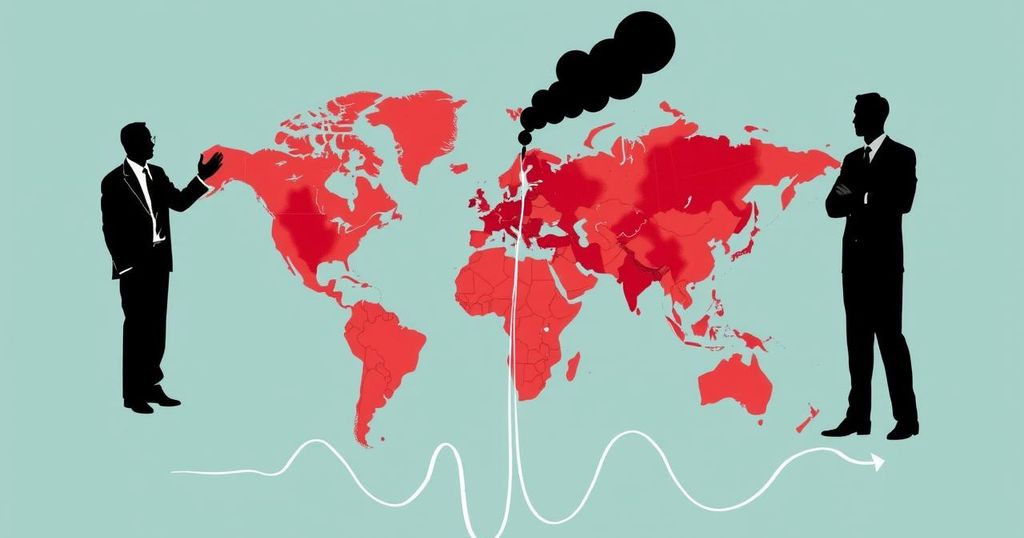The Influence of Fossil Fuel Lobbyists at COP: A Call for Reform

As COP29 approaches, attendance declines among key figures, raising concerns about the influence of fossil fuel lobbyists in climate negotiations. With a significant rise in fossil fuel representatives at COP meetings, there are growing advocacy efforts for reform to ensure corporate interests do not undermine climate goals. The upcoming COP30 in Brazil may represent a vital opportunity to readdress this long-standing issue as leaders advocate for a sustainable future free from fossil fuel influence.
As COP29 approaches in Baku, Azerbaijan, attendance among prominent leaders and advocates dwindles significantly, reflecting a growing skepticism regarding the efficacy of the Conference of the Parties (COP) in combating climate change. Established as a pivotal forum for global climate action, COP has faced intense scrutiny over the increasing influence of fossil fuel lobbyists, whose presence undermines the integrity of climate negotiations. Recent figures indicate an alarming rise in fossil fuel representatives at these meetings, culminating in calls for reform to exclude corporate interests conflicting with climate goals.
Historically, COP has served as the principal platform for international climate agreements, such as the Kyoto Protocol and the Paris Agreement. However, the past few meetings have seen an unsettling trend: host nations heavily reliant on fossil fuel economies and an influx of fossil fuel lobbyists, which critics contend dilutes genuine climate action. Consequently, many have begun advocating for stringent measures to limit fossil fuel influence, urging a shift towards more transparent practices that prioritize environmental health.
Numerous influential figures in climate policy, including former UN Secretary-General Ban Ki-moon, have publicly supported the idea of restricting fossil fuel lobbyists from COP discussions, arguing that their presence taints the legitimacy of the conferences. Nevertheless, some luminaries believe a balanced approach is essential, recognizing the economic realities different countries face. While fossil fuel dependency is a significant hurdle, it cannot overshadow the urgent need for progressive climate policies and cooperative approaches.
The upcoming COP30 in Brazil carries exceptional weight, as it presents a crucial opportunity to address and potentially curb the influence of fossil fuel interests in climate negotiations, with Brazilian authorities expressing a commitment to advance climate initiatives.
The overarching challenge remains: how to reshape the UNFCCC into a conflict-free zone that prioritizes global climate goals without excluding legitimate interests of member nations. Advocates for reform remain hopeful that the process can evolve, leading to a more sustainable future where climate action does not become the casualty of corporate lobbying.
The Conference of the Parties (COP) is the key decision-making body of the UN Framework Convention on Climate Change (UNFCCC), established to confront global climate challenges through collective action. Over the decades, COP has facilitated significant agreements, including the Kyoto Protocol and the Paris Agreement, which aimed to mitigate global warming and foster international collaboration. Despite its historic importance, recent COP meetings have been marred by concerns regarding the overpowering presence of fossil fuel lobbyists who undermine the convention’s goals, leading to demands for reforms that could prevent corporate interests from infiltrating climate discourse. Given the critical urgency of climate action, particularly as global temperatures rise, the integrity of COP is under scrutiny as stakeholders call for a return to its original mission of promoting sustainable policies without the shadow of big oil influence.
The intensifying debate surrounding fossil fuel lobbyists at COP meetings highlights a critical intersection of economy and climate policy. There are strong calls from global leaders for reform, invoking the need to create a climate negotiation space free from corporate lobbying that conflicts with the overarching goal of sustainable development. The forthcoming COP30 in Brazil will present a pivotal opportunity to potentially reset the trajectory of international climate action and strengthen the integrity of UNFCCC processes. Only through collaboration and commitment among all stakeholders can a viable solution to climate change be effectively pursued.
Original Source: www.corporateknights.com






